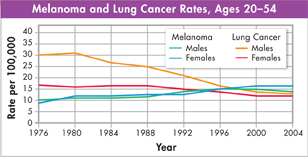Analyzing Data
The Rising Rate of Melanoma
Over the past several decades, the incidence of some deadly cancers, such as lung cancer, has decreased among people aged 20–54. Some people attribute this to decreasing smoking rates. During the same time period, the incidence of melanoma increased for the same age group. The incidence of both lung cancer and melanoma increases with age. But melanoma is one of the most common cancers in young adults.
What are some possible reasons for this increase? Despite public health efforts, many people still consider tanned skin a sign of health. Also, many people do not use enough sunscreen for it to be effective.
Interpret Graphs Describe the trend shown in this graph for the incidence of lung cancer and melanoma from 1976 to 2004.
Infer In what year does the rate of melanoma surpass the rate of lung cancer in men? In women?
Predict The data are only for a specific age group. If you were to look at similar data for the whole population, how do you think the graph would differ? Explain.
Skin Problems
 What are some problems that affect the skin?
What are some problems that affect the skin?
More than any other organ, the skin is constantly bombarded by internal and external factors that affect its health.  The skin's constant interaction with the environment can lead to problems of varying degrees of severity. Such problems include acne, hives, and skin cancer.
The skin's constant interaction with the environment can lead to problems of varying degrees of severity. Such problems include acne, hives, and skin cancer.
Acne Acne develops when sebum and dead skin cells form plugs in hair follicles. Bacteria are often trapped in the plug, which leads to infection and inflammation. Up to 85 percent of people experience acne to some degree during adolescence and young adulthood. One hypothesis about acne suggests that high hormone levels during puberty lead to increased sebum production. There are many treatments for acne that can be purchased over the counter. But if the acne is severe and scarring is likely, a dermatologist—a doctor who specializes in skin care—should be consulted.
Hives Allergic reactions to food or medicine often display themselves as red welts commonly called hives. When the body experiences an allergic reaction, a chemical called histamine may be released. Histamine causes small blood vessels to widen. Fluid can ooze from the vessels into surrounding tissues, which causes the swelling that leads to hives.

Table of Contents
- Formulas and Equations
- Applying Formulas and Equations
- Mean, Median, and Mode
- Estimation
- Using Measurements in Calculations
- Effects of Measurement Errors
- Accuracy
- Precision
- Comparing Accuracy and Precision
- Significant Figures
- Calculating With Significant Figures
- Scientific Notation
- Calculating With Scientific Notation
- Dimensional Analysis
- Applying Dimensional Analysis





